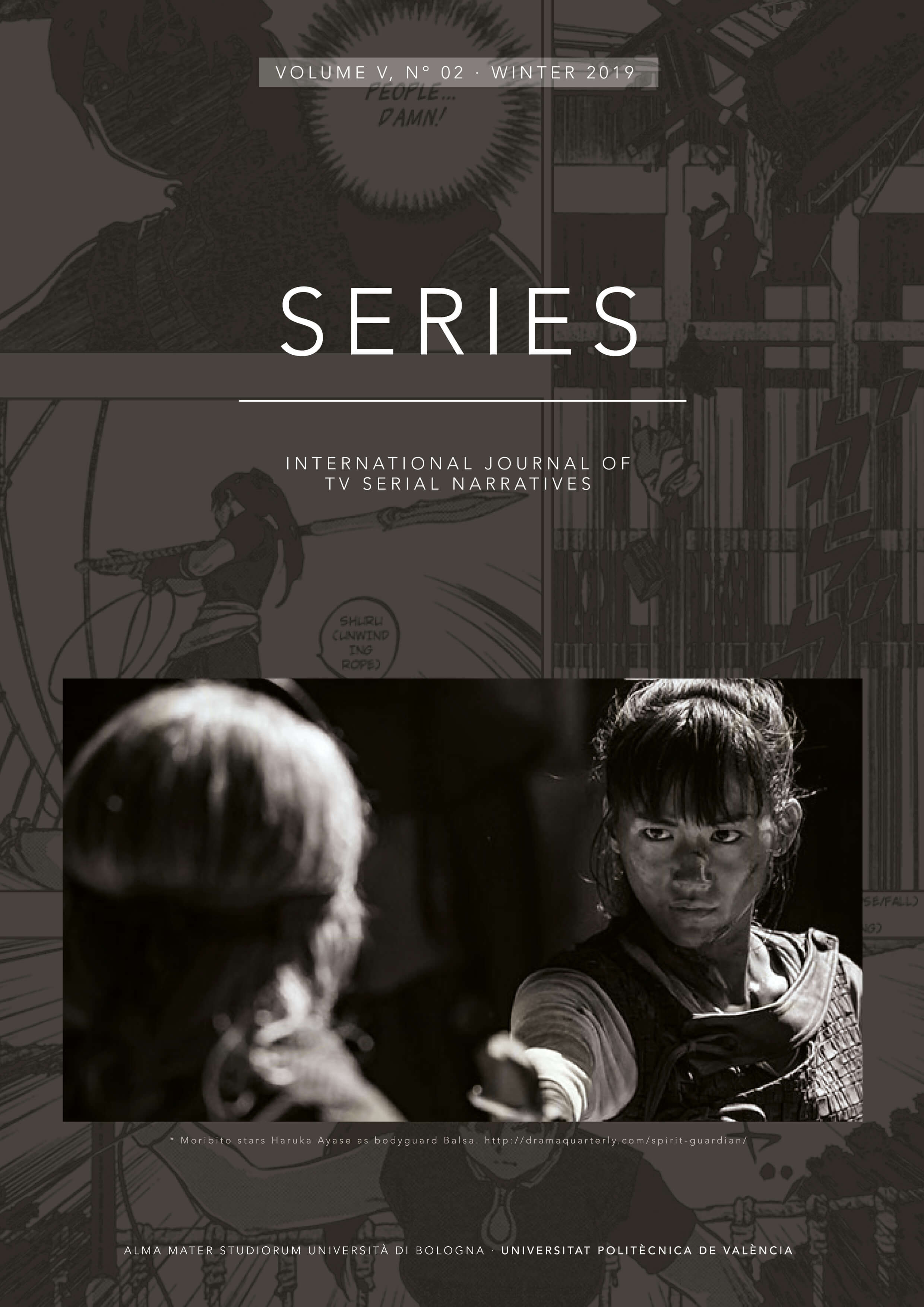Music Keeps Us Together. Pop Songs in Korean Television Dramas
DOI:
https://doi.org/10.6092/issn.2421-454X/9161Keywords:
K-Drama, soundtrack, hallyu, pop song, leitmotifAbstract
In the early 1990s the “trendy drama” became part of Korean TV programming. Mainly focused on a younger audience, it not only showed the modern urban life style of its protagonists searching for love, but also integrated newly composed pop music into the series, first as theme songs and later by playing musical pieces at crucial moments in the developing relationships of the young couples.
This article analyzes the crucial part these songs play both in marketing a Korean series (or K-Drama), as well as in the development of its narrative, exemplified by the musical concepts of three recent series, Dokkaebi: The Lonely And Great God (2016-2017), While You Were Sleeping (2017) and Because This Is My First Life (2017). Similar to the concept of a leitmotif, once established as a song for a character, a couple or a mood, pop songs are used throughout the run of a series. They, therefore, add a new layer of meaning to a scene, not only through lyrics and music, but especially by referring to past developments and incidents, thus holding the whole series together and giving it an individual character.References
Bribitzer-Stull, Matthew (2015). Understanding the Leitmotif. From Wagner to Hollywood Film Music. Cambridge: Cambridge University Press.
Cagle, Robert L. (2014). “‘Don’t Forget’. The Musical Dimensions of South Korean Television Drama.” In Reading Asian Television Drama. Crossing Borders and Breaking Boundaries, edited by Jeongmee Kim, 193-213. London, New York: I. B. Tauris.
Donnelly, Kevin (2005). The Spectre of Sound: Music in Film and Television. London: BFI Publishing.
Freedman, Alisa (2015). “Working women and romance on Japanese television dramas: changes since Tokyo Love Story.” In Television Histories in Asia: Issues and Contexts, edited by Jinna Tay and Graeme Turner, 112-126. London, New York: Routledge.
Fuhr, Michael (2015). Globalization and Popular Music in South Korea: Sounding Out K-pop. New York: Routledge.
Herman, David (2002). Story Logic: Problems and Possibilities of Narrative. Lincoln: University of Nebraska Press.
Hong, R. (2017). “Indie Band Rocoberry Talks About Composing Tracks For ‘Goblin’ OST.” Soompi 23 January.
https://www.soompi.com/article/941117wpp/indie-band-rocoberry-talks-about-composing-tracks-goblin (last accessed 30-12-18).
Holbrook, Morris B. (2005). “The Ambi-Diegesis of ‘My Funny Valentine’.” In Pop Fiction. The Song in Cinema, edited by Steve Lannin and Matthew Caley, 47-62. Bristol, Portland: intellect.
Jin, Dal Yong (2016). New Korean Wave. Transnational Cultural Power in the Age of Social Media. Urbana: University of Illinois Press.
Kim, Jeongmee (2014a). “Introduction. East Asian Television Drama. A Story of Booms, Fevers and Waves.” In Reading Asian Television Drama. Crossing Borders and Breaking Boundaries, edited by Jeongmee Kim, 1-24. London, New York: I. B. Tauris.
Kim, Jeongmee (2014b). “Say Hallyu, Wave Goodbye. The Rise and Fall of Korean Wave Drama.” In Reading Asian Television Drama. Crossing Borders and Breaking Boundaries, edited by Jeongmee Kim, 239-262. London, New York: I. B. Tauris.
Kim, Hae Joo (2015). Hearing the Korean Global: Hallyu in the music of K-dramas. PhD dissertation. Middletown: Wesleyan University.
Kim, So-yeon (2017). “Lee Seung-gi’s ‘A Korean Odyssey’ faces nightmare before Christmas.” The Korea Herald 25 December. http://www.koreaherald.com/view.php?ud=20171225000230 (last accessed 30-12-18).
Chung, Ah Young (2011). K-Drama A New TV Genre With Global Appeal. Korean Culture and Information Service-Ministry of Culture, Sports and Tourism.
Lannin, Steve and Caley Matthew (2005). “Introduction.” In Pop Fiction. The Song in Cinema, edited by Steve Lannin and Matthew Caley, 9-14. Bristol, Portland: intellect.
Lee, Jung-yup (2009). “Contesting the digital economy and culture: digital technologies and the transformation of popular music in Korea.” Inter-Asia Cultural Studies 10(4): 489-506. https://doi.org/10.1080/14649370903166143.
Lee, Hye-won (2015). “’Reply 1988’ OST sweeps music charts.” Kpop Herald 29 November. http://kpopherald.koreaherald.com/view.php?ud=201511291826533317709_2 (last accessed 30-12-18).
Lee, Sangjoon (2015). “Introduction. A Decade of Hallyu Scholarship. Toward a New Direction in Hallyu 2.0.” In Hallyu 2.0. The Korean Wave in the Age of Social Media, edited by Sangjoon Lee and Abé Mark Nornes, 1-27. Ann Arbor: University of Minnesota Press.
Lie, John (2015). K-pop. Popular Music, Cultural Amnesia, and Economic Innovation in South Korea. Oakland: University of California Press.
Oh, Youjeong (2015). “The Interactive Nature of Korean TV Dramas. Flexible Texts, Discursive Consumption, and Social Media.” In Hallyu 2.0. The Korean Wave in the Age of Social Media, edited by Sangjoon Lee and Abé Mark Nornes, 133-153. Ann Arbor: University of Minnesota Press.
Park, JaeYoon and Lee Ann-Gee (2019). K-dramas. Essays on Korean Television and Its Global Consumption. Jefferson: McFarland.
Park, Jin-hai (2017). “Viewers angry over commercial breaks.” The Korea Times 15 May. http://www.koreatimes.co.kr/www/art/2017/05/688_229408.html (last accessed 30-12-18).
Rodman, Ronald (2017). “The Popular Song as Leitmotif in 1990s Film.” In Changing Tunes. The Use of Pre-existing Music in Film, edited by Phil Powrie and Robynn Stillwell, 122-138. London, New York: Routledge.
Sohn, JiAe (2016). “K-drama masterpieces (6): ‘Jealousy’.” Korea.net 15 December. http://www.korea.net/NewsFocus/Culture/view?articleId=142680 (last accessed 30-12-18).
Stanley, Adrienne (2014). “K-pop Vocalist Lisa Talks About K-drama Soundtracks & Korean Musical Theater.” Kpop Starz 14 June. https://www.kpopstarz.com/articles/95555/20140614/K-pop-vocalist-lisa-talks-about-K-drama-soundtracks-korean-musical-theater.htm (last accessed 30-12-18).
Yoon, Tae-Jin and Dal Yong Jin (2017). “Introduction. The Korean Wave. Twenty Years, Retrospect and Prospect.” In The Korean Wave. Evolution, Fandom, and Transnationality, edited by Tae-Jin Yoon and Dal Yong Jin, xi-xix. London: Lexington Books.
Yoon, Tae-Jin and Kang Bora (2017). “Emergence, Evolution and Extension of ‘Hallyu Studies’. What Have Scholars Found from Korean Pop Culture in the Last Twenty Years?” In The Korean Wave. Evolution, Fandom, and Transnationality, edited by Tae-Jin Yoon and Dal Yong Jin, 3-21. London: Lexington Books.
Zen, Menahem (2016). “tvN releases trailer of new drama ‘Goblin’ starring Gong-Yoo, Kim Go-Eun, Lee Dong Wook.” Kpop Starz 2 November. https://www.kpopstarz.com/articles/274907/20161102/tvn-releases-teaser-trailer-new-drama-goblin-replace-k2-starring.htm (last accessed 30-12-18).
Downloads
Published
How to Cite
Issue
Section
License
Copyright (c) 2019 Veronika Keller
Copyrights and publishing rights of all the texts on this journal belong to the respective authors without restrictions.
This journal is licensed under a Creative Commons Attribution 4.0 International License (full legal code).
See also our Open Access Policy.





